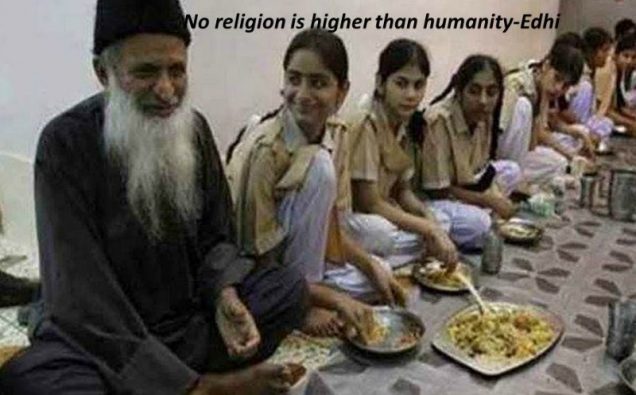
Abdul Sattar Edhi, who passed away in Karachi on Friday at the age of 88, embodied so many noble traits that it is difficult to pay tribute to him by highlighting any one of them that makes him a revered figure in Pakistan – humble, simple, selfless, humanitarian, champion of the poor, savior, protector of the suffering humanity, a picture of dedication, inspiration and unflinching commitment, and so on.
His lifelong and selfless service to humanity, which he began in 1951 with the establishment of the first welfare center, spread to all parts of Pakistan, Jammu and Kashmir and Baltistan. The Edhi Foundation took care of the orphaned, the vulnerable in the times of natural disasters, the wounded, the downtrodden, victims of all kinds, and the elderly.
In Karachi, which has had such a large share of violence over the past three decades, the ambulance service that Edhi ran saved many lives after bombings and shootings. His Foundation also arranged funeral and burial services for the unclaimed and unidentified dead.
More than six decades of service that Edhi has rendered to the suffering humanity has been done with the spirit that service to humanity is service to God. All along, Edhi has inspired his wife, family, and countless people to be philanthropic, generous, and considerate towards the underprivileged and be a balm for those who have been denied the basic human rights, pledged by all faiths, and constitutions.
Edhi has also been an influential interfaith voice, extending services to people of all faiths including Pakistan’s Christian and Hindu minorities as he believed that “no religion is higher than humanity.” In doing so, he symbolized the true spirit of Islam – mutual caring, sharing, and peaceful coexistence.
His mother’s love for humanity was a vital inspiration for him. Once, as related by Edhi, his mother praised him for working for humanity in his childhood years, when he sustained injuries while defending a handicapped kid from schoolchildren who were beating him up – a motivation which shaped the rest of his life with the strands of common human bonds. That must also serve as an example of a moral upbringing.
Perhaps no other humanitarian plea could define Edhi’s life-saving message more succinctly than the one that is part of his “Jhoola” or cradle program that asks people to spare the lives of “unwanted” babies and let them live under the charity program.
“Do not kill, leave the baby to live in the cradle,” reads the message that has saved many babies, especially females, from the jaws of death.
It is this spirit and victory for life over death, for love over hate and for affinity over apathy that represents Edhi’s mission, particularly in these times of chaos and conflicts that expose many innocent people to death and destruction.
Edhi’s selfless devotion to the protection of the suffering humanity radiates an ideal that needs to be preserved and practiced in all societies. The way Edhi exhibited the nobility of the human mind and heart would be a rare, hard-to-emulate example. But his life will remain a powerful inspiration for those who believe in the power of decency and virtue.













